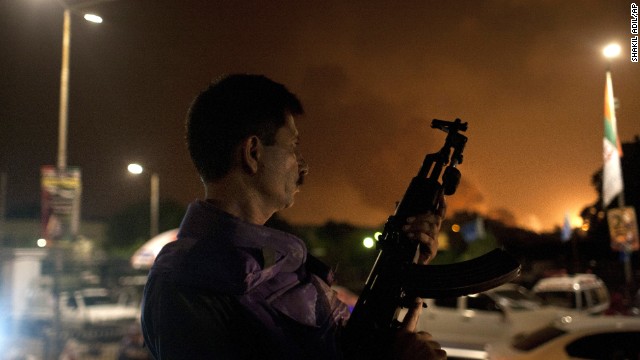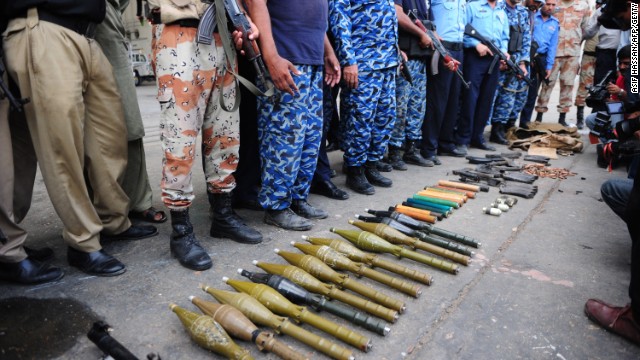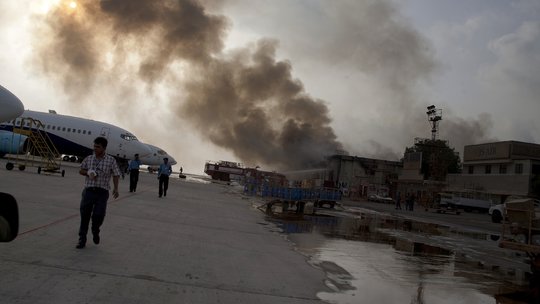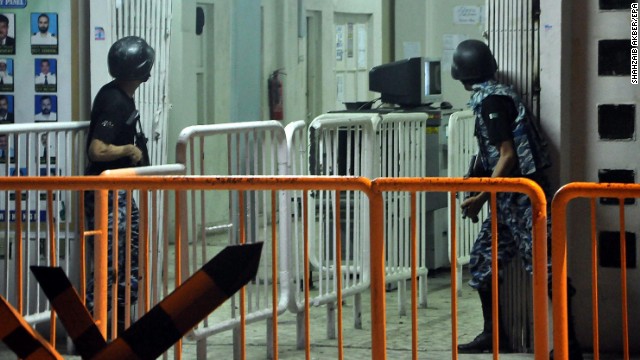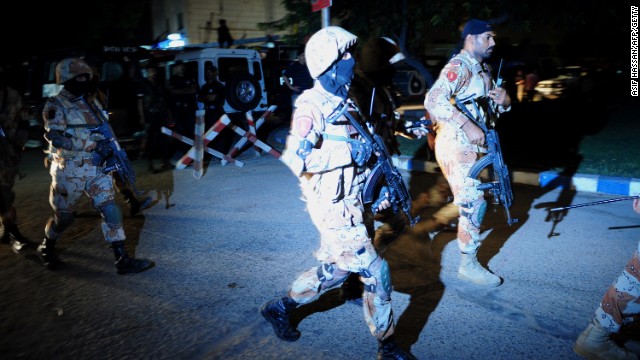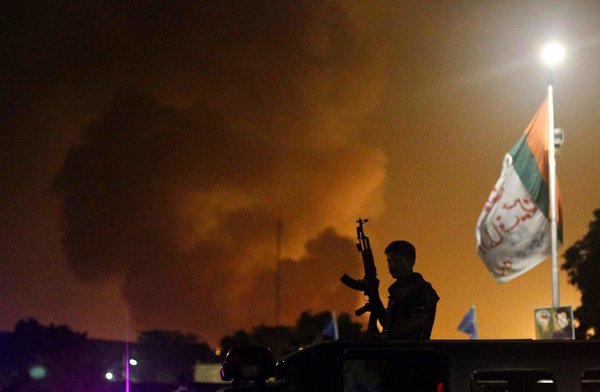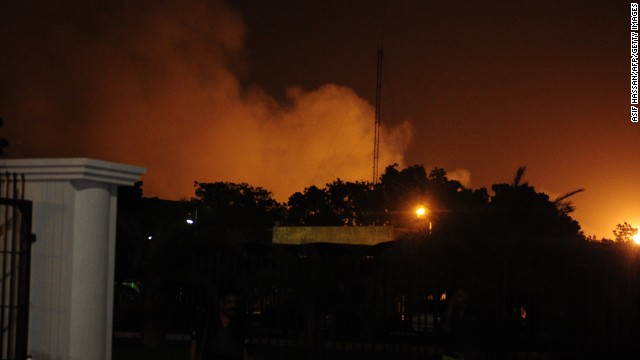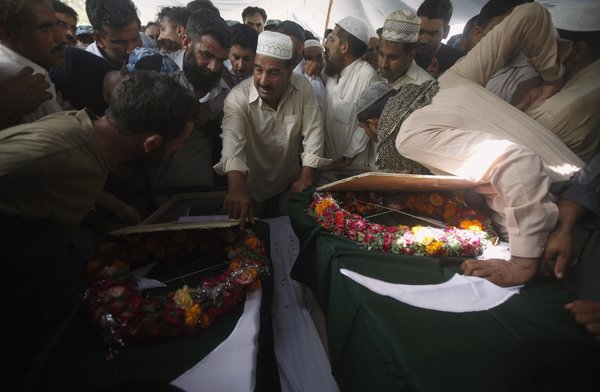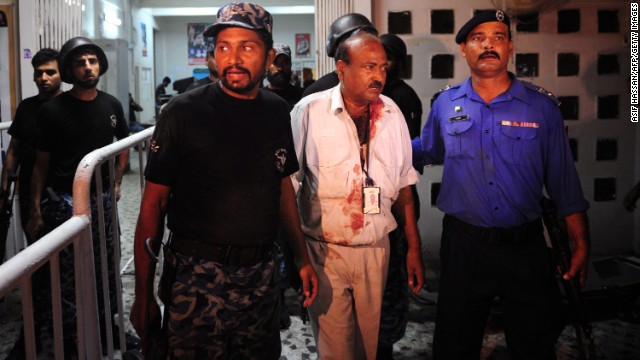Terrorists Attack In Pakistan Airport Leaves 31 Dead And 18 Injured
On 8 June 2014, at least 10 armed militants attacked Jinnah International Airport in Karachi, Sindh, Pakistan; 31 people were killed, including 10 attackers, and at least 18 persons were wounded.
On the night of 8 June, armed militants attacked Jinnah International Airport in Karachi, Sindh, Pakistan
A Pakistani soldier is on guard at the airport Sunday, June 8. A building caught fire in the attack, but no planes were damaged, a military spokesman said.
Image via turner.comAccording to preliminary information from Pakistani security officials, the attack began when about five assailants gained access to the Jinnah airport, apparently shooting their way through a gate near the old terminal. At least five others entered separately; they may have blasted their way through a wall near the cargo area, officials said.
Pakistani police display weapons seized from militants in the attack on June 9.
Image via turner.comOnce inside, the militants began lobbing grenades and took up positions near the runway and in the airport’s cargo area.
washingtonpost.comPHOTO: The scene at the airport in Karachi, Pakistan, after militants stormed past security, firing automatic weapons and hurling grenades
The armed militants were dressed as security guards, with some also wearing suicide vests
They were wearing uniforms of the Airports Security Force (ASF), and had used fake IDs to enter the airport. A senior Pakistani intelligence official said some of the militants tried to hijack a plane, but were unsuccessful.
aljazeera.comAll arriving flights were quickly diverted from the airport, which serves 6 million passengers annually. Three international flights were scheduled to leave between 11 p.m. and 1 a.m., going to Sharjah, United Arab Emirates; Bangkok; and Dubai. But all passengers at the airport were evacuated safely, according to Maj. Gen. Asim Saleem Bajwa, the spokesman for Pakistan’s military and security agencies.
washingtonpost.comAbout 90 minutes after the attack began, hundreds of Pakistani army commandos arrived on the scene and began battling the armed militants
Pakistani security personnel arrive at the site of the airport attack on June 8.
Image via turner.comThe attackers were reported to have initially seized control of the airport tarmac and runways. Within hours, eight of the ten militants were shot dead by the Army commandos and the remaining two blew themselves up when they were cornered.
washingtonpost.comThe siege officially ended after five hours; 31 people, including the ten terrorists, eight ASF personnel, two Pakistan Rangers officials, a Sindh Police officer, and two Pakistan International Airlines officials were killed in the incident. At least 18 security personnel were also injured in the attack and admitted to Abbasi Shaheed Hospital.
One Pakistan International Airlines plane, one Air Blue plane and a cargo plane of a foreign airline were reported damaged. A hand grenade had also been used in the attack in Ispahani Hangar.
dawn.comThe Tehrik-i-Taliban Pakistan (TTP) has claimed responsibility for the attack, describing it as retaliation for the death of its former chief Hakimullah Mehsud, who was killed in a drone attack in November 2013
Gunmen waged an extended firefight with security forces at Pakistan’s largest international airport before being killed
Image via nyt.comThe Pakistani Taliban said they carried out the attack in response to air strikes in their strongholds near the Afghan border and that their mission was to hijack a passenger plane. "The main goal of this attack was to damage the government, including by hijacking planes and destroying state installations," said Shahidullah Shahid, a Taliban spokesman.
"This was revenge for Hakimullah Mehsud's martyrdom" (Mehsud was killed in a U.S. drone strike in November, 2013), and a warning against the impending military operation the government is preparing against the "helpless and innocent tribes in Waziristan," a TTP statement sent to media via email said.
In an earlier message on their Facebook page, the TTP said: "The biggest reason for attacking Karachi airport is because it serves as the biggest air logistics center supplying goods for the Crusaders' war in Afghanistan and Pakistan," referring to the Karachi Port which handles the Afghanistan-bound U.S.-NATO cargo.
TTP spokesman Shahidullah Shahid explained why the airport was targeted:
"We chose a location where there would be less civilian and more official casualties," TTP representative Shahidullah Shahid said. Shahid warned the group will engage "in a full-out war with the Pakistani state, starting on June 10." But "if even now the Pakistani government backs down," Shahid said, "we are ready to engage in meaningful dialogue."
PHOTO: Relatives and colleagues of airport security personnel killed in the attack, gathered near the coffins after funeral prayers
What does the attack reveal about security in Karachi?
Employees leave the airport June 9 after the attack. The Pakistani prime minister's office said flights will resume Monday evening at the country's largest and busiest airport.
Image via turner.comThe Karachi attack exposed the weaknesses in the early warning capacity of the Pakistani security apparatus; while forces on ground managed to engage and neutralize the attackers within five hours -- restoring air traffic by noon -- questions loom over the intelligence.
cnn.comHasan Askari Rizvi, a prominent security commentator based at Lahore, wonders as to how such a big number of attackers remained undetected. This requires a deep introspection and represents a huge challenge for the government and the entire security agencies. Counter-terrorism would require extremely close coordination, which could possibly help in early warning as well, he said.
